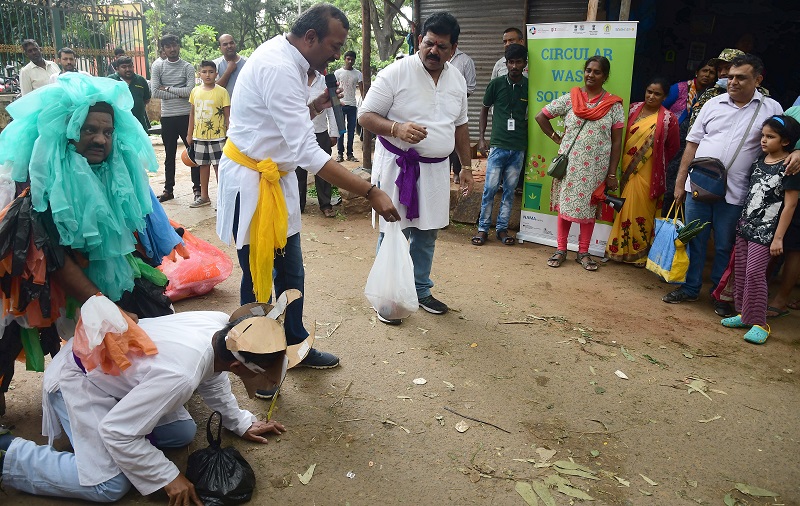When waste is not segregated at source, it becomes hard to process, and civic agencies simply offload it at landfills. However, if you take the trouble to separate plastic from veggies and other waste, both composting and recycling become viable
Hyderabad has trouble booting up segregation
So, the task of segregating the city’s 7,000-odd tonnes of daily garbage largely falls on the Hyderabad Integrated Municipal Solid Waste Limited (HiMSW) facility in Jawahar Nagar. Waste collectors, who pick up about 270 tonnes of waste daily from homes, also do their bit by removing recyclable materials and selling these directly to recycling units.
Data from HiMSW operator Re Sustainability shows plastic makes up one-seventh of Hyderabad’s daily waste. This includes polyethylene terephthalate (PET) commonly used in bottles, polypropylene (PP), high-density polythene (HD) and low-density polythene (LD) used in packaging, etc.
Despite the national ban on single-use plastic (SUP), it forms about 13% or 915 tonnes of Hyderabad’s daily waste as plastic carry bags are still available at vegetable, fruit, meat and other markets across the city.
The city also has a plastic recycling unit of 20-tonne capacity that converts plastic into granules and LD bags, primarily for biomedical waste collection. On average, it recycles 17 tonnes of plastic daily, with 5 tonnes turned into bags and the rest into granules for plastic moulding units.
No check, Chennai’s recycle bin is choking
Hundreds of tonnes of plastic waste in Chennai ends up in landfills because most households do not segregate their waste. Greater Chennai Corporation’s (GCC) own data shows only 38% of the waste is segregated.
This is partly because residents are not penalised for not segregating waste. But the civic agencies are equally to blame as they mix all the waste collected from doorsteps. They also do not have infrastructure for second-tier segregation.
As a result, it is not clear how much of Chennai’s 5,200 tonnes of daily waste is plastic, although bio-mining of waste at the landfills suggests the figure is around 7%. GCC processes 400 tonnes of plastic every week at its incineration plants in Manali and Kodungaiyur, and at its material recovery facilities.
At Chennai’s two mega-landfills, TOI saw dumpers unloading on the already mountain-like heaps. Bags, covers, wrappers and hard boxes made up most of the plastic waste.
Geo Damin, a solid waste management (SWM) expert who was part of Tamil Nadu’s SWM committee, said landfills cannot be eliminated because non-recyclable waste, such as sachets, has nowhere else to go.
“The Union government has given guidelines on what should enter landfills and what shouldn’t. But we are not following this,” Damin said, adding, “most of the plastic, including shampoo bottles and detergent containers, can be segregated and reused”. However, multilayer juice and milk cartons are currently impossible to recycle because they have alternating layers of aluminium and paper.
What is the way out? Damin suggested giving incentives to the waste collectors at landfills. Environmental scientist Darwin Annadurai said changing public behaviour is crucial. “People are too lazy to use alternatives like cotton bags. The market is also filled with items packaged in plastic. If we carry containers and use our own cotton bags, we can restrict plastic use to some extent.” Thereafter, segregating waste at home will reduce the plastic going to landfills.
For now, GCC is getting rid of plastic waste by supplying it to cement plants. Its chief engineer for solid waste management, N Mahesan, said they shred about 400 tonnes of plastic every week and will increase it to 500 tonnes soon.
Garbage grows, but Bengaluru has an operating system for it 
Every day, about 2,000 tonnes of wet waste (food waste, for example) is sent for composting to multiple processing centres, and 1,400-1,600 tonnes of dry waste, including 600 tonnes of plastic, goes to 124 dry waste collection centres (DWCCs).
The good news is that all of this plastic waste, plus 700-800kg of plastic seized by marshals and corporation staff, is sent for recycling.
“No plastic waste is sent to the landfill in Bengaluru,” says Harish Kumar, CEO of Bengaluru Solid Waste Management Limited and special commissioner (solid waste), BBMP. “All DWCCs daily send out plastic waste to three recycling units empanelled by the BBMP. We are also in the process of setting up recycling units near the landfill to recover any material fit for recycling,” he adds.
When it comes to single-use plastic (SUP), which was banned last year, the city has been strict but its task is made difficult by plastic manufacturing units outside its jurisdiction. Kumar says most of the trucks seized last year with SUP had come from Gujarat and Tamil Nadu.
Next up is a plan to build a 600 tonnes-per-day waste-to-energy plant at Bidadi in collaboration with Karnataka Power Corporation Limited.


